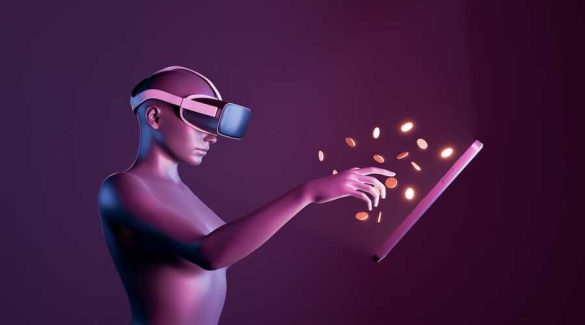Introduction
The Metaverse is a virtual world that allows users to create, explore and interact with digital environments, objects and other users. One of the defining features of the Metaverse is its virtual economy, which allows users to buy, sell, and trade virtual goods and services using virtual currencies. In this blog post, we will discuss the role of virtual economies in the Metaverse, including their impact on the overall user experience and the potential for economic growth and innovation.
Virtual Currencies in the Metaverse
In the Metaverse, virtual currencies are used to facilitate transactions between users. These currencies are typically issued and managed by the platform operator or other third-party providers, and they can be used to buy virtual goods, services, and other assets within the virtual world.
One of the most popular virtual currencies in the Metaverse is the cryptocurrency, which is based on blockchain technology. Cryptocurrencies offer several advantages over traditional virtual currencies, including greater security, transparency, and decentralization. This makes them an ideal option for users who want to participate in the Metaverse’s virtual economy without relying on centralized platforms or intermediaries.
Virtual Goods and Services
The virtual economy of the Metaverse is primarily driven by the sale of virtual goods and services. These can include anything from virtual clothing, accessories, and furniture to virtual land, vehicles, and other assets. Some virtual goods are purely cosmetic, while others offer functional benefits, such as improved performance or increased abilities.
Virtual services in the Metaverse can also be highly varied. They can include anything from virtual consulting, design and construction services to virtual entertainment, education and training services. As the Metaverse evolves and expands, we can expect to see a wide range of new and innovative virtual services emerge.
Virtual Real Estate
Another key aspect of the Metaverse’s virtual economy is virtual real estate. In the Metaverse, users can purchase and own virtual land, which they can then use to build and develop virtual structures, businesses, and communities.
Virtual real estate is becoming an increasingly valuable asset in the Metaverse, as more users seek to establish a presence and build their own virtual spaces. In addition to its potential as a valuable investment, virtual real estate also offers users a great deal of creative freedom and flexibility, allowing them to design and develop their own unique environments and experiences.
Virtual Markets and Trading
In addition to buying and selling virtual goods and services, users in the Metaverse can also participate in virtual markets and trading activities. These markets can include everything from virtual stock exchanges and auction sites to peer-to-peer trading platforms and decentralized marketplaces.
Virtual markets and trading can offer a range of benefits to users, including greater transparency, lower transaction costs, and increased liquidity. They can also facilitate the exchange of a wide range of assets and currencies, making it easier for users to engage in economic activities across different virtual worlds and platforms.
Economic Growth and Innovation
The virtual economy of the Metaverse has the potential to drive significant economic growth and innovation in the coming years. As more users enter the Metaverse and begin participating in its virtual economy, we can expect to see a wide range of new business models, products, and services emerge.
Virtual economies can also offer a range of benefits to traditional businesses, including increased customer engagement, expanded reach, and new revenue streams. As more businesses begin to explore the potential of the Metaverse, we can expect to see a growing number of partnerships, collaborations, and integrations between virtual and traditional economies.
Virtual Economies and Social Interaction One of the most interesting aspects of virtual economies in the Metaverse is their impact on social interaction. As users engage in economic activities, they are also creating social connections and relationships with other users. These interactions can take many forms, from collaborative efforts to create and sell virtual products to the formation of virtual communities around shared interests.
Virtual economies also allow users to express themselves in new and unique ways, from designing their own virtual products to establishing their own virtual businesses. This can lead to increased self-expression and creativity, as well as a sense of personal empowerment and achievement.
Challenges and Opportunities for Virtual Economies
While virtual economies in the Metaverse offer a range of benefits and opportunities, they also face several challenges. One of the most significant is the issue of fraud and security. Virtual economies are highly vulnerable to scams and other forms of fraud, which can result in significant losses for users.
Another challenge is the issue of governance and regulation. Virtual economies are largely unregulated, which can make it difficult for users to trust the platforms and currencies they are using. This can also create opportunities for bad actors to exploit the system and engage in illegal activities.
Despite these challenges, virtual economies in the Metaverse offer significant opportunities for growth and innovation. As the Metaverse continues to evolve and expand, we can expect to see new and innovative business models and products emerge, as well as increased collaboration and integration between virtual and traditional economies.
Conclusion
Virtual economies are a critical component of the Metaverse, offering users the ability to buy, sell, and trade virtual goods and services. These economies are driving economic growth and innovation, while also providing users with new opportunities for self-expression, creativity, and social interaction.
While virtual economies face several challenges, including issues of fraud and regulation, they also offer significant opportunities for growth and innovation. As the Metaverse continues to evolve, we can expect to see virtual economies play an increasingly important role in the digital economy, driving new business models, products, and services, and creating new opportunities for users around the world.

